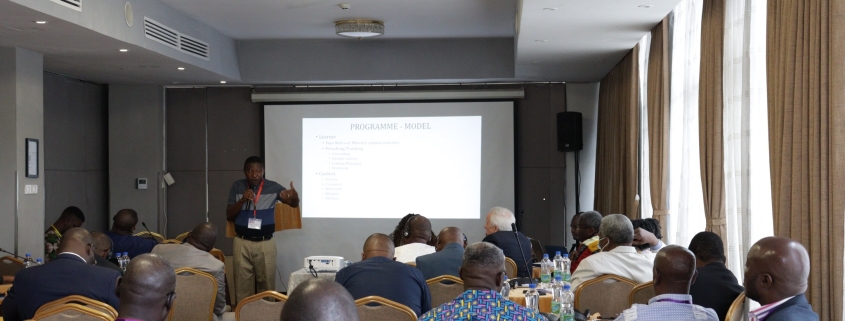SCALING UP NON-FORMAL BIBLICAL AND THEOLOGICAL TRAINING: AEA’S STRATEGIC CONSULTATION IN ADDIS ABABA
April 9, 2024
National Evangelical Fellowships (NEFs) of the Association of Evangelicals in Africa (AEA) gathered in Addis Ababa, Ethiopia, for a crucial consultation on scaling up non-formal biblical and theological training for Christian leaders in Africa. This urgent mission was introduced to the members of the AEA Governing Council by AEA’s General Secretary, Dr. Master Matlhaope, Project Leader Dr. Ted Barnett, and Curriculum Designer Prof. John K. Jusu. The consultation highlighted the importance of equipping Christian leaders with robust theological and biblical knowledge, especially through non-formal training methods that can reach a broader audience more effectively.
The consultation in Addis Ababa was marked by enthusiastic participation from esteemed leaders representing various nations across Africa. They recognized the critical need for enhanced biblical and theological training to support the growing Christian communities on the continent. The leaders shared insights and strategies on how to implement this training more effectively, considering the diverse cultural and educational contexts within Africa. Their collective commitment to this mission underscored the shared vision of empowering Christian leaders with the necessary tools and knowledge to guide their communities with wisdom and integrity.

Dr. Master Matlhaope, in his address, emphasized the strategic importance of non-formal education in reaching a wider audience. He noted that formal theological education, while valuable, often remains inaccessible to many potential leaders due to geographical, financial, and logistical barriers. Non-formal training programs, on the other hand, can be more flexible and adaptable, making it possible to deliver high-quality biblical education to those who might otherwise be excluded.
Project Leader Dr. Ted Barnett and Curriculum Designer Prof. John K. Jusu provided detailed presentations on the proposed training programs. They highlighted the curriculum’s design, which is tailored to meet the specific needs of African Christian leaders. The curriculum focuses on practical theology, leadership skills, and contextual biblical interpretation, ensuring that the training is both relevant and impactful. Their presentations were met with strong approval, and many leaders expressed eagerness to implement these programs in their respective countries.
The contributions from the NEF leaders were invaluable, reflecting a deep understanding of the challenges and opportunities within their local contexts. They offered constructive feedback on the curriculum design and suggested various implementation strategies that could enhance the reach and effectiveness of the training programs. Their active participation demonstrated a collective commitment to the mission and a readiness to collaborate on this transformative project.

In conclusion, the consultation in Addis Ababa was a significant milestone in AEA’s mission to scale up non-formal biblical and theological training for Christian leaders in Africa. The enthusiastic support and contributions from NEF leaders across the continent reaffirmed the importance of this initiative. By leveraging non-formal education methods, AEA aims to empower a new generation of Christian leaders equipped to serve their communities effectively and faithfully. The collective efforts of AEA and its member fellowships will undoubtedly play a crucial role in strengthening the church’s foundation and expanding its impact throughout Africa.



